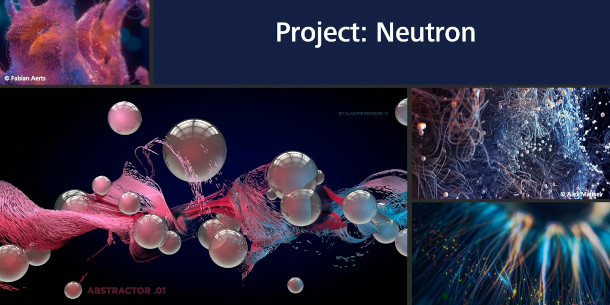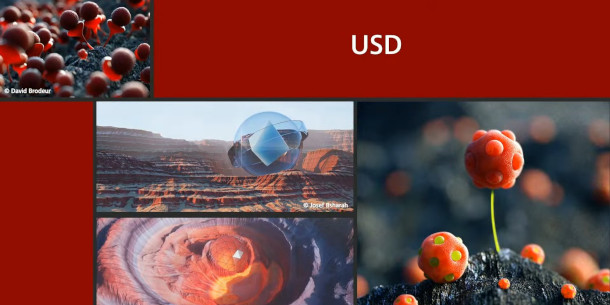Maxon unveils Project: Neutron

Maxon has unveiled Project: Neutron, a new node-based architecture for Cinema 4D, promising to enable users to do anything from procedural modelling to motion graphics via a visual programming workflow.
The functionality, which some users have already dubbed ‘Houdini 4D’, will be rolled out as a tech preview in the next public release, then fleshed out gradually over subsequent updates.
Maxon made the announcement, along with sneak peeks at other new features due in Cinema 4D R22, as part of its 3D and Motion Design Show livestreams in what would normally have been Siggraph 2020 week.
Create anything from models to motion graphics by wiring nodes together
Described by Maxon CEO David McGavran as the “future of Cinema 4D”, Project: Neutron is an ongoing project to implement a node-based core architecture for the software.
It forms part of a series of updates to Cinema 4D’s core, which also resulted in the node-based material system introduced in Cinema 4D R20.
Project: Neutron takes the same visual programming paradigm – author complex systems by wiring nodes together – and extends it to a much wider range of tasks.
The livestream showed a range of potential use cases, including creating a motion graphics effect consisting of an array of animated spheres and scattering a forest of procedural trees across a landscape.
It can even be used for procedural modelling: one demo showed it in use to create the scales on a 3D fish.
In a tweet, motion designer and Cinema 4D trainer EJ Hassenfratz described the system as “Houdini4D?”, in reference to the similar node-based workfoows available in SideFX’s procedural 3D software.
‘Blazingly fast’ – but completely optional
McGavran described the Neutron Engine as “blazingly fast”, commenting that Maxon was testing it with scenes containing multiple millions of objects.
However, Project: Neutron will “enable node-based workflows, not enforce them” with an implementation similar to the Cinema 4D Object Manager, which creates nodes invisibly in the background of a scene.
“If you’re not interested in digging into nodes, you’re not going to have to,” said Paul Babb, Maxon’s global head of community. “You’re going to have the same playful creative workflow [as before].
Project: Neutron will be available as a preview in the next version of Cinema 4D, although it isn’t clear how much you will be able to do with it: Maxon says the the first release won’t provide an “end-to-end workflow”.
The toolset will be fleshed out over subsequent releases.

Also due in Cinema 4D R22: Python 3 and USD support
Other changes planned for the next version of Cinema 4D – presumably Cinema 4D R22, if Maxon sticks to its current naming conventions – include support for Python 3.
The move makes Maxon one of a number of major developers updating to Python 3.7, the version specified by the current VFX Reference Platform after Python 2.x reached its official end of life earlier this year.
According to a blog post by Maxon senior product manager Rick Barrett, the change will only require “tweaks” to existing scripts and plugins.
“If developers have predominately used Cinema 4D’s API the changes should be minor, and most changes can be made in a backwards-compatible way,” he wrote.
Maxon also announced that the next version of Cinema 4D will be able to import and export data in USD format, including geometry, materials, cameras and lights.
As well as standard USDC binary files, Cinema 4D will support human-readable USDA files and the zipped USDZ format developed for augmented reality applications.
McGavran also revealed that Maxon has a working prototype of Cinema 4D running on the upcoming Apple Silicon Macs, but didn’t say when Apple Silicon support would be available in a public release.
Release dates and system requirements
Maxon will announce more details about the next public release of Cinema 4D at IBC 2020 in September.
Of the current stable builds, the subscriber-only Cinema 4D S22 is available for Windows 10 and macOS 10.13.6+; the perpetually licensed Cinema 4D R21 runs on Windows 10 and macOS 10.12.6+.
New perpetual licences costs $3,495. Subscriptions start at $94.99/month for Cinema 4D alone, or $116.99/month with the Redshift renderer.
Read more about Cinema 4D on Maxon’s website
(No information about Project: Neutron at the time of writing)
